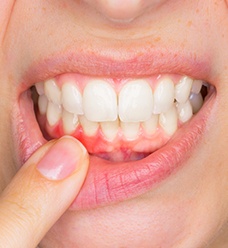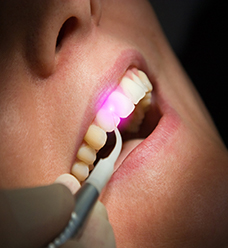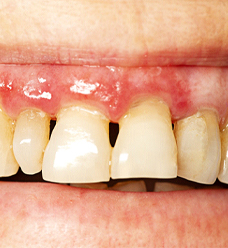
Periodontal (gum) disease affects more than 50% of US adults, and has been linked to such chronic and systemic illnesses as heart disease, diabetes, and stroke. At Jacksonville Dental Specialists, we help patients suffering from gum disease restore their oral health whether they are experiencing the early, mild form of the disease, gingivitis, or the more advanced version, periodontitis. We offer a wide array of treatment options for patients with gum disease, and we work with patients to create a plan for ongoing care that renews their oral health and prevents reinfection in the future. Contact our team to find out more about gum disease treatment in Jacksonville or schedule an appointment. We also welcome patients from Arlington, Orange Park, and other surrounding communities.

Gum disease, also called periodontal disease, occurs when inflammation damages the gums and underlying bone that keep the teeth in place. These structures serve as the cornerstone of good dental health, and when they’re unable to function normally, even otherwise healthy teeth can become loose and fall out.
You’ve probably heard the term for the first stage of gum disease: gingivitis (which means “inflamed gums.”) Fortunately, gingivitis can usually be reversed with six-month dental cleanings and good brushing and flossing habits.
But if gingivitis isn’t caught and treated early enough, it progresses to later stages of periodontitis where it can no longer be cured. However, it can be treated to keep it from getting worse, which will greatly lower your risk of tooth loss and the many health conditions associated with gum disease such as heart problems.

Chances are that you won’t feel much pain or discomfort from gum disease, especially in the early stages. But there are still symptoms to watch for, including:
If you have any of these symptoms, come in for an evaluation at your earliest convenience. We have multiple types of gum disease treatment that are very effective, but the earlier we treat your gums, the better.
Gum disease isn’t an automatic sentence to tooth loss. With multiple treatment options, we can help you maintain your smile for many years to come.

In the earliest stage of gum disease, more frequent professional cleanings may be enough to reverse the damage and restore your oral health. However, as gingivitis progresses to the more advanced periodontitis, more thorough cleanings are necessary. Typically that includes a combination of two deep cleaning procedures: scaling and root planing. Scaling is the careful removal of plaque, tartar, and infected gum tissue. This can be completed with metal hand tools or with a soft tissue laser. Once all of the plaque and tartar are removed from teeth, the roots are smoothed. This procedure is known as root planing, and the smooth surfaces make it more difficult for plaque and tartar to build up under the gums. This reduces the patients’ risks for reinfection. Following scaling and root planing, we may also apply topical antibiotics in order to reduce the amount of bacteria under the gums.

Traditionally, scaling and root planing procedures were completed using metal tools, scalpels, and stitches. While this was effective, patients often experienced significant discomfort and bleeding during the procedure, and with immune systems already weakened by advanced gum disease, struggled to recover without further infection afterward. Our cutting edge soft tissue laser allows us to complete these procedures in less time, with less bleeding and discomfort during treatment, and faster healing time following the procedure. The laser uses high intensity light waves to precisely target damaged or infected gum tissue, allowing us to remove minimal amounts of tissue as well as plaque and tartar below the gumline. It also cauterizes the gums to greatly reduce the amount of bleeding during treatment. Since stitches are not typically necessary, patients heal much faster and are less likely to experience reinfection.

One of the main side effects of advanced gum disease is gum recession. Patients often notice this when their teeth start to appear longer. In some cases, gum tissue naturally resumes its healthy shape and volume after treatment, but in other situations, we’ll need to graft tissue from other parts of the mouth, a tissue bank, or synthetic gum tissue to restore the lost shape and structure. Whenever possible, we try to take the graft tissue from one of three locations: the flap on the roof of the mouth, the palate, or the cheek. First, we try to let the gums regrow on their own, but when the roots are exposed, it can result in pain or sensitivity. To minimize this risk, gum grafting may be the best option. The procedure is relatively simple: We numb the area to be treated, place the new tissue, and stitch it in position.

Gum disease is somewhat like diabetes in that it requires ongoing care to be effectively managed. After we’ve treated your gums, we’ll work with you closely to help you maintain your progress. Depending on your needs, we’ll recommend cleanings (called periodontal maintenance visits) every 3, 4, or 6 months to remove any plaque and bacteria under your gumline that you can’t remove at home.
We’ll also perform a gum exam at these appointments to catch any recurring problems as early as possible and will spend time reviewing how to keep everything clean at home. Your oral hygiene habits are critical, so we may demonstrate the best brushing and flossing techniques or recommend special tools such as an electric toothbrush or oral irrigator.
With gum disease treatment and a few good habits at home, you can stabilize your gums, prevent tooth loss, and reduce your general health risks. If you’d like to get started on the road towards a healthier smile, give us a call today!

If you think you have unhealthy gums, you should seek out gum disease treatment right away; this is to prevent the situation from becoming worse with time. Of course, in order to act quickly, you should take the time to learn as much about gum disease and its treatment as soon as possible before you actually need such knowledge. We’ve answered some particularly common questions related to periodontal health below; get in contact with our Jacksonville team right away if you have further concerns.
One of the biggest risk factors for infected gums is poor oral hygiene – in other words, not brushing, not flossing, and skipping your biannual dental appointments and checkups. These bad habits increase the level of harmful bacteria in your mouth, and an infection becomes more and more likely the longer the issue isn’t reversed.
There are other factors that can make it easier for your gums to become infected. If you have smoking or diabetes, for example, your immune system will be less capable of fighting off the bacteria that causes the disease. Of course, sometimes the problem is simply genetic; many patients inherit a vulnerability to gum disease from their parents.
Multiple studies have shown that patients who have gum disease are more likely to experience heart attacks, strokes, and other cardiovascular problems. It has yet to be confirmed that gum disease can be the direct cause of a heart attack, possibly because heart problems share many of the same risk factors as gum disease. That said, many researchers think that the harmful bacteria in your gums could cause inflammation and infection in other areas of the body, including the arteries. In any case, you shouldn’t take chances with your health; seek out gum disease treatment before the damage has a chance to get worse.
The health of your mouth shares a connection with the health of your body. In addition to heart problems, gum disease might increase your risk for dementia (especially Alzheimer’s), diabetes, certain kinds of cancer, and complications during pregnancy. The longer you let gum disease go unaddressed, the larger an impact it will have.
You can protect your gums similarly to the way you protect your teeth: with an excellent oral hygiene routine and two dental appointments every year. When you brush, pay attention to the gum line; it can be easy to miss plaque that has accumulated around that area. You should start flossing on a daily basis if you don’t already; otherwise you’ll miss food particles that your toothbrush can’t reach. For added protection, think about using mouthwash that can kill most of the harmful bacteria that remains in your mouth.
Dental checkups are essential for gum health. It’s our best chance to remove any tartar deposits that are hiding under your gum line, thus reducing the chance of an infection developing and going unaddressed for too long.